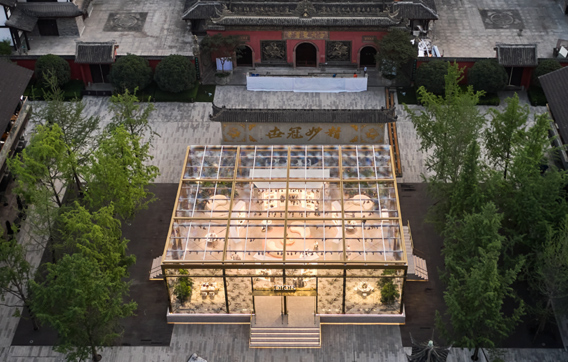Redefining Event Infrastructure: The Sustainable Solution to Wasteful Construction
更多信息
您可以通过以下方式与我们联系,我们将尽快为您提供反馈
-
美国
+1 (513) 331 2658
-
亚洲
800-820-6030
-
邮箱
info@roder-architecture.com
2020 官网升级中!现在您访问官网的浏览器设备分辨率宽度低于1280px请使用高分辨率宽度访问。

As the global community becomes increasingly aware of the importance of sustainability and environmental conservation, construction projects are not being left behind. Companies and contractors are now adopting environmentally conscious strategies that align with the need for sustainable development. Here are five major environmentally conscious considerations that every construction project should incorporate:
1. Sustainable Building Materials
Choosing Responsibly Sourced Products
The selection of building materials plays a critical role in the environmental impact of a construction project. Opting for sustainable, recycled, or upcycled materials can significantly reduce a project’s carbon footprint.
Key Strategies:
• Opt for materials like bamboo, recycled steel, and reclaimed wood.
• Use low-VOC (Volatile Organic Compounds) paints and finishes to improve indoor air quality.
• Consider local materials to reduce transportation emissions.
How Modular Construction Can Help:
Modular construction allows for precise ordering of materials, thereby significantly reducing waste. Also, the controlled environment of a factory allows materials to be stored in optimal conditions, reducing the likelihood of spoilage or damage.
2. Energy Efficiency and Renewable Energy
Designing with Energy in Mind
An energy-efficient design not only reduces a building’s ongoing operating costs but also its environmental impact.
Key Strategies:
• Integrate energy-efficient HVAC systems, lighting, and insulation into the design.
• Install solar panels, wind turbines, or geothermal systems to harness renewable energy.
• Utilize energy-efficient windows and building orientation to take advantage of natural light and reduce heating and cooling needs.
How Modular Construction Can Help:
Modules constructed in a factory can be built to precise tolerances, leading to better-sealed seams and energy-efficient buildings with less air leakage.
• Integration of high-quality insulation and energy-efficient windows and doors is streamlined in a factory setting.
• Modular buildings are often designed to easily incorporate renewable energy systems, such as solar panels or wind turbines, after the on-site assembly.
3. Water Conservation and Management
Protecting Our Most Vital Resource
Water is a critical resource that construction projects must handle responsibly. Effective water management strategies can significantly reduce a project’s impact on local water systems.
Key Strategies:
• Install low-flow fixtures and appliances to reduce water consumption.
• Incorporate rainwater harvesting systems and graywater recycling systems.
• Use drought-resistant plants in landscaping to reduce the need for irrigation.
How Modular Construction Can Help:
Water conservation features can be integrated into the design of modular buildings from the outset.
• Designing modules that accommodate low-flow fixtures, efficient HVAC systems, and other water-saving devices.
• Modules can be designed for easy integration with greywater and rainwater harvesting systems, reducing the need for potable water.
4. Waste Reduction and Management
Minimizing Waste, Maximizing Efficiency
Construction projects are notorious for generating significant amounts of waste. Adopting a mindful approach towards waste can lead to cost savings and a lower environmental footprint.
Key Strategies:
• Plan for waste reduction from the outset by ordering materials in precise quantities.
• Recycle and reuse materials wherever possible.
• Properly dispose of hazardous waste to prevent contamination of local ecosystems.
How Modular Construction Can Help:
The factory-controlled environment of modular construction allows for precise use of materials, significantly reducing offcuts and waste.
• Detailed planning and computerized tools allow for exact measurements and efficient use of materials.
• Unused materials in one project can be easily stored and used in subsequent projects, greatly reducing overall waste.
5. Site Selection and Land Use
Building Responsibly from the Ground Up
The choice of where to build is just as important as how to build. Sensitive site selection can preserve local ecosystems and reduce the environmental impact of construction.
Key Strategies:
• Avoid building in floodplains, wetlands, or other ecologically sensitive areas.
• Use land efficiently through multi-story designs and compact footprints.
• Preserve existing trees and vegetation as much as possible and consider replanting native species post-construction.
How Modular Construction Can Help:
Modular construction generally requires less time on the construction site, leading to less site disturbance and environmental impact.
• Because much of the construction occurs off-site, there is less damage to the existing landscape and ecosystems.
• Modular construction’s ability to work within compact and pre-defined footprints helps in efficient land use and preserving the natural surroundings.
RÖDER Architecture
Our structures are entirely prefabricated at the factory and assembled on site, the whole installation process does not involve construction waste, noise pollution or welding. The entire process has a low carbon footprint and the facility itself can be relocated. Over a 95% of the structure can be reused making it environmentally friendly.
EMAS – Röder Group’s Environmental Statement
RÖDER Group has been awarded the EMAS seal. The “Eco-Management and Audit Scheme” of the environmental management system certifies RÖDER’s environmentally conscious working methods, the use of climate-friendly processes, a sustainable use of resources –and the company’s willingness to continuously improve its own environmental performance in the future.
As the demand for more environmentally responsible construction practices continues to grow, these five major considerations represent foundational principles for achieving sustainability in construction projects. Implementing these practices does not merely contribute to environmental protection but can also result in cost savings and enhanced building performance in the long run.
With each construction project that adopts these principles, we move one step closer to a world where buildings are not just places to live and work, but are also harmonious, integrated parts of our global ecosystem.
By prioritizing sustainable building materials, energy efficiency, water conservation, waste reduction, and thoughtful site selection, constructors and developers can significantly contribute to a more sustainable and environmentally conscious future.

Redefining Event Infrastructure: The Sustainable Solution to Wasteful Construction
 更多
更多

Unleashing Innovation: Modular Construction in the Events Industry
 更多
更多

RÖDER Prefabricated Aluminum Alloy System | Multi functional Solution in the Industry
 更多
更多
